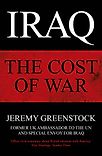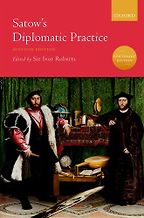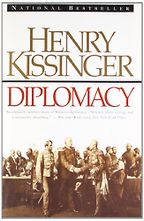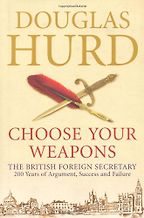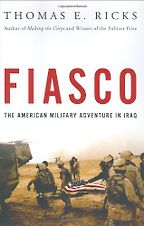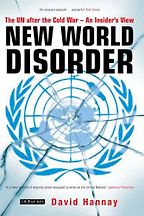Shall we start with the book that dates back to 1917, Satow’s Diplomatic Practice?
Satow’s was re-edited last year by Sir Ivor Roberts, the president of Trinity College, Oxford. It is the only book that explains both what diplomacy is and how it is organised across the world, with the UK at the centre. It’s a thick book, and it’s full of details and documents about all the world organisations – but it is an extremely interesting account of how diplomacy works and what its machinery does. As a diplomat I found that people don’t really understand what diplomats do. No Joe Bloggs sitting in the pub is going to read Satow’s Diplomatic Practice, but if you pick through it you will find some fascinating glimpses into what actually goes on in embassies, in international organisations, in governments when it comes to international relations.
Does the book home in on certain historical incidents or episodes? How is it organised?
It follows a fairly standard content list, which Satow originally put together in 1917, and has now been updated. It goes through a history of diplomacy and what diplomacy does and how it deals with politics and power. The book talks about the machinery of diplomatic relationships in countries, it talks about the technical side of diplomacy and its immunities, the way that embassies work in countries. It sets out in quite a lot of detail what the international organisations are and how they work.
And the book is still relevant even though it dates from so long ago? Does it have relevance in the internet age?
It’s been brought up to date six times, so this edition is from 2009 and it’s fully fresh and absolutely up to date. Your question about the relevance of diplomacy is a different one from the value of Satow’s book on diplomacy. Satow is explaining how diplomacy works and how diplomats work. What diplomacy achieves and why it’s necessary is a slightly different question.
Let’s go on to Kissinger’s book Diplomacy, and why you’ve chosen that.
The importance of Kissinger’s book is that it is fundamentally about power. It’s amazing how seldom people – newspapers, blogs, speeches – talk about power, but power is the raw thing at the heart of every political unit. The central unit in international affairs is the national government; in political affairs, there is no higher level of decision-making in the world than the national government. All the supranational stuff that goes on in the EU, the UN and NATO, is always a grouping of nation states. The councils of all these supranational bodies are representatives of the nation states. Even in the EU, in pillar one, countries can back out of things, if they really want to, as nation states.
What Kissinger does is relate diplomacy to power and to relationships between people of power. He does that by describing various stages that he’s observed of 20th-century American history – how Americans have tried to enlarge their interests and protect their nation and national sovereignty through diplomacy. He looks at the relationship between diplomacy and the use of force and the importance of individual leaders who hold power, and he talks particularly about the great power holders of the 20th century – Nixon, Mao Zedong and Zhou Enlai, Reagan, Gorbachev. He goes back to Teddy Roosevelt and Woodrow Wilson, to talk about the collective effort after World War I.
Five Books interviews are expensive to produce. If you're enjoying this interview, please support us by donating a small amount.
Is it about realpolitik and his own personal views and experience or does he try to be more objective?
Kissinger is a great figure of 20th-century diplomacy and therefore it is about his experience – you’re looking at diplomacy through the eyes of a great exponent of the diplomatic art. It’s about what went on around him, what went on that he had to try to promote, rearrange, manipulate and steer and how that worked and what the effects were. It’s about what he observed other people doing when he was subordinate to them – because he was only a foreign minister, not a head of state. He then relates his experience of the 20th century and his own diplomatic career to the new world order that he sees forming in the post-Cold War period. He is, above anybody else, the great link between the Cold War period and the post-Cold War period in terms of the practice of diplomacy and the effect of diplomacy.
Is there a specific point that he makes that really stuck with you, that really rings true?
I think it is his realpolitik message. You can follow a diplomatic line of principle, as Woodrow Wilson did, and try and create a doctrine for collectivism – but power will always intervene, particularly at the national level and therefore you have to be prepared to create enough power to hold your own interests against competition from others. You have to be able to ward off, before there is the use of force – through persuasion, through words rather than weapons – the attacks that there may be on your interests and on your lines of activity. Increasingly, in the post-Cold War period, this is coming through in areas like trade, and attention being paid to the developing world, rather than between the great powers. He’s trying to explain how it needs to be adapted in this new era. But this book was published in 1995, and global change is running away from him. His example of how you relate power to interests and how you arrange a peaceful structure of international relationships round the circumstances of the age, is relevant in its lessons – but increasingly the world is looking different from the one he was looking at when he wrote the book. The importance of the book is understanding the effect of power and the input of those who understand how to use power.
What about the Douglas Hurd book, Choose Your Weapons?
This is a more recent book, and to some extent it’s a continuation of the Kissinger theme. In choosing your weapons he’s referring to the Castlereagh-Canning duel at the beginning of the 19th century, which he uses as a symbol of the duel between principle and realpolitik. Castlereagh is the realpolitik specialist – the Machiavelli, the Metternich, the Kissinger. Canning is the man of principle, the Woodrow Wilson in the argument. Hurd then takes that all the way through to the post-millennium age – you have to choose whether you think principle comes first, or circumstance comes first. And as always with Douglas Hurd – and that’s the cleverness of the book – he says (or at least implies) that there doesn’t need to be a hard choice between those two; there is a balance you can strike. Both are important: if you do one without the other, you will make bad mistakes, but if you understand the nature of the power of principle and the power of events and relate the two, and keep both in contact with each other, you’ll come out with a sensible set of policies – and you will be able to implement those policies in the real world without falling over precipices. So what he’s really saying in Choose your Weapons is, you can choose which side of the camp you come from, but if you’re sensible, whichever side of the camp you come from, you’ll end up in the same place – of sensible policy.
One of the Amazon reviews said it was a real page-turner. Is it a very engaging read?
It’s not a dramatic read, because he’s not that sort of writer, but as a writer of novels he has a good ear for anecdote. He tells plenty of lovely stories in the diplomatic arena. The clarity of what he is saying comes through particularly strongly at the end.
Your next choice is the Thomas Ricks book about Iraq, Fiasco.
Because Iraq was the seminal event of the end of my career, and because my name is connected in people’s minds, in recent memory at least, with Iraq, both at the UN and in Baghdad, I thought it was right to put on my list a book that tries to explain why Iraq went wrong, particularly after the invasion. Yes, there were a large number of people who were very angry about the principle of going to war in Iraq at all – but, actually, if Iraq had been well handled after the invasion, and it was clear that the state of Iraq and the life of its people was improving as a result of what we had done, a lot would have been forgiven around the decision to go to war with or without the necessary legitimacy. I’ve chosen Thomas Ricks’s book because it is an anecdotal book and a non-judgmental book. It is mainly composed of interviews with soldiers and civilians working on the ground in Iraq, members of the US Armed Forces and Iraqis, people in the Coalition Provisional Authority. As these interviews and anecdotes accumulate, the book shows how difficult it was for people on the ground to try to make sense of the Iraq mission they had been set when their principals back home did not seem to understand the mission or devote the right resources to it, or correct early mistakes soon enough for them not to become existential mistakes for the mission in Iraq. You get a better and more accurate sense of that from Fiasco than from any other book written within five years of the invasion in 2003. That’s why I invite people to read it: to try and understand what happened. A lot of it illustrates the cock-up rather than the conspiracy theory: people don’t mean to make mistakes, they want to do well, a large number of people are busting a gut to do the right thing in the job they’ve been assigned, but the macro picture, the large mission concept, the resources in men and dollars that are put into it and the international and regional structure, for what is supposed to be done, have just not been established in the right way to allow the micro effort that is going into it from all these individuals, to glue together into a success. That’s a big lesson. The mission was wrongly set and the resources were wrongly allocated. And the magnificent work that was done was largely wasted, and lives with it – both the lives of Iraqis and of outsiders.
Your feeling is that it wasn’t a mistake to go into Iraq – the mistake was what happened afterwards, which is what this book describes?
I think the legal grounds were thin, but just about bearable, but the political legitimacy –the degree of support we had internationally – was not broad enough to get the feeling we were doing something on behalf of a wider community, and therefore the legitimacy was lost, which was a mistake that mattered more to the UK than to the US. But the planning and execution of the post-invasion stage could have been much more effectively done. We could have had a chance of being successful in Iraq at a much earlier stage than now. What has happened is that the political process has held good in Iraq, but the security and the economic and social development of Iraq has been much, much too slow. And that in itself has security consequences – and will have political consequences…We don’t know yet whether Iraq will be a success story within the generation after the invasion or not. It does take that long to turn a country around – the same is true for Afghanistan and any other country we try and mend.
Finally, David Hannay’s New World Disorder.
This is a book about the UN, which is the only diplomatic mission on which I still do a good deal of talking and retirement diplomacy. I chose this to give the general reader an idea of what the UN is like after the Cold War. David Hannay stopped being the UK ambassador to the UN in 1995, but he has remained closely connected to it ever since, both on the issue of Cyprus, and as Chairman of the United Nations Association in the UK, and as a member of Kofi Annan’s High Level Panel on Threats, Challenges and Change.
Hannay tries to explain what the UN does well and what it does less well. He tries – I think successfully – to keep people’s morale up about the fundamental usefulness of the UN, if we understand what its limitations are, and what the limitations of governments are, in their use of the UN. Because the UN is an inter-governmental organisation, not a separate agency to which governments can turn to mend the china when they’ve broken it.
The UN and the governments are the same agency, in the political and inter-governmental sphere. The UN also has a secretariat and many funded agencies and programs that do magnificent work: it’s a setter of norms, it’s a repository of treaties, it’s a maintainer of international agreements on all sorts of things – aviation, maritime, trade unions, the postal system. Lots of international things happen without you or me knowing about them, or understanding the way states work together in all their machinery. David Hannay brings this out and reminds us that we have reached a higher level of collectivism in this era of mankind, the post-Cold War era, than ever before, but there are still huge flaws in the capacity of our international institutions to deal with all our problems without reform.
So is he advocating change at the UN or is he saying that it’s always going to be flawed by definition, because it’s all these different countries working together?
He’s actually pointing out what opportunities have been missed since the end of the Cold War in making the UN a more useful forum and structure. He illustrates this by showing how the world turned from the Cold War era to the post-Cold War era, and how governments didn’t see that they had to make an extra effort to clinch the multinational machinery. You can see that over climate change now, after Copenhagen, that is a follow-on subject from what David Hannay is saying. Nation states and the governments themselves are not putting enough investment into the multilateral machinery to ensure that there is lubrication for global peace and security and global relationships, and economic exchange into the future. So there is, to some extent, a pessimistic message in there: we could have got it right, we didn’t get it right, there are things we must do, if we don’t do them, we may well be heading for more trouble. That’s the overall message.
You alluded to it earlier, but do you want to add anything about the relevance of diplomacy in the modern age?
Yes, I do, because I think the UK is under-investing in diplomacy and as a result is much more likely to need its armed forces, which are also reducing in number as we speak. There is a vacuum opening up in our capacity to protect our own interests and our own affairs as the UK – because we aren’t investing enough in a practice, a profession, a mechanism, which still has just as much value as it ever did, whatever the forms or channels that it uses. Because power always has to be brokered between centres of power – to avoid wars and to come to arrangements and compromises, preferably in a constructive rather than a zero-sum way. And it is the judgments, the negotiation skills, the understanding, the analysis which you get from your diplomatic service as a government, which make that possible. You cannot get that degree of quality from the internet or from the media, from the private citizen or from the corporate sector. There are skills of judgment and of action involved in experienced diplomacy that you can’t get from anywhere else – and those are still as necessary in the modern world as they ever were.
Interview by Sophie Roell, Editor
July 8, 2010. Updated: December 6, 2024
Five Books aims to keep its book recommendations and interviews up to date. If you are the interviewee and would like to update your choice of books (or even just what you say about them) please email us at [email protected]

